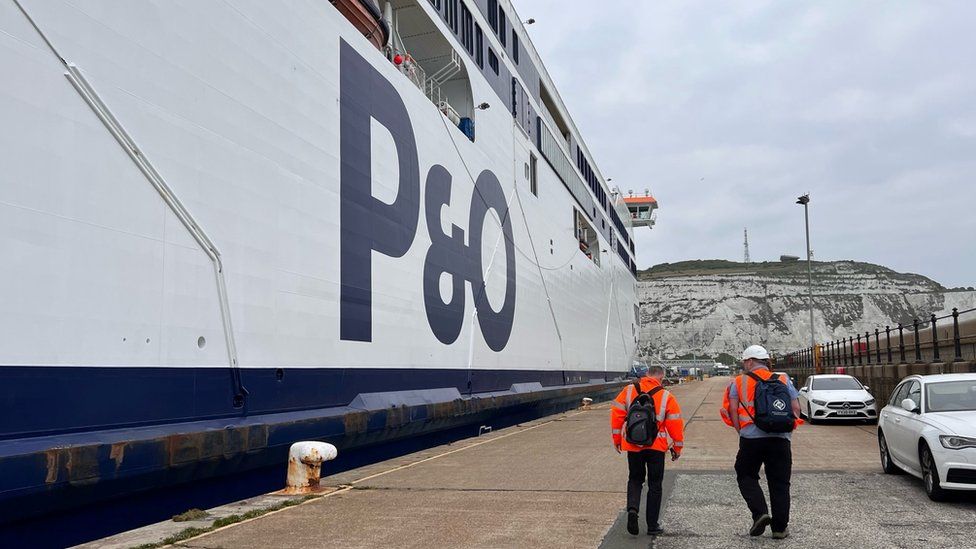P&O Ferries has hit back at claims that it tried to get its new cheaper agency staff to accept even lower wages.
The RMT Union said it received reports of new workers at Dover being asked to sign new contracts, replacing ones they had signed weeks ago, on lower pay.
It reported P&O Ferries to the Maritime and Coastguard Agency, which ensured the new workers retained their wages.
But P&O Ferries told the BBC “no agency seafarers were asked to accept reduced wages”.
The company, which has come under fire for sacking 800 workers without notice and replacing them with cheaper agency staff in March, said there were “no plans to change or reduce the wages” of the new seafarers.
Its statement on Monday came after the National Union of Rail, Maritime and Transport Workers (RMT) claimed a seafarer on the Spirit of Britain ferry at Dover, hired as a replacement for the sacked staff last month, contacted the union begging for help in a dispute over pay.
The union said the company was now “trying to bring in an exploitative model, with the lowest possible standards they can get away with”.
‘They don’t care’
In an email seen by the BBC the worker wrote: “They don’t care about our rights. They try to give us less money. We are desperate.”
The seafarer told the union they were being forced to work without contracts, after old ones had expired. The worker claimed documents had also been lost by P&O Ferries.
“This is my sixth day working without a contract, please help us!,” they said.
The RMT union complained to the Maritime and Coastguard Authority (MCA) about the new move by P&O Ferries who ensured seafarers’ contracts were amended with their original wages reinstated.
The MCA confirmed it had investigated the complaint and “as a result the affected seafarers were issued with amended contracts, which reverted to their original wages”.
However, P&O Ferries said there had been an “administrative misunderstanding” around a contract presented to one individual who appeared to have been “unaware of an appendix which made clear that he would be entitled to an additional £195 a month, meaning that there was no change in his overall pay”.
A spokesman said the company had contacted the MCA “to request that they withdraw their statement, which is misleading”.
“We will continue to comply fully with any national minimum wage obligations introduced by the UK government,” he added.
P&O has previously declined to comment on how much agencies pay workers on ferries.
Some of P&O’s ferries are registered in Cyprus, meaning they do not have to pay the minimum wage required by UK law, which rose to £9.50 an hour from 1 April.
P&O Ferries’ sackings timeline:
- 17 March: P&O Ferries sacks 800 staff and begins replacing them with cheaper agency workers.
- 24 March: P&O Ferries boss Peter Hebblethwaite admits to MPs that the decision to sack 800 workers without notice broke the law and says he would make the same decision again if he had to.
- 28 March: Transport Secretary Grant Shapps urges P&O to re-employ sacked workers and says the government plans to make it illegal for ferry firms to pay less than the minimum wage.
On Friday, the Spirit of Britain, which operates between Dover and Calais, was cleared to resume sailing after inspections by the MCA. It had been held at the port since 12 April due to a number of unspecified deficiencies, according to the regulator.
RMT officials went aboard the Spirit of Britain to speak with new seafarers on Friday, who it said shared complaints over contracts.
National secretary Darren Proctor, who was on the visit, claimed P&O Ferries had “brought people in on a month contract, some on two-month contracts” and then told them that they have to accept lower pay rates if they want to stay on.
“P&O is undermining safety and creating a lowest possible denominator in ferry standards,” he said.
When P&O Ferries sacked its staff in March, the company said the move was to ensure the future of the business.
Transport Secretary Grant Shapps has said he wants to see British ports refusing access to ferry companies “who don’t pay a fair wage”.
He has said the government will consult on changes needed to make it a legal requirement, but urged ports to take action “as soon as practical”.
However, British ports have described the new pay plans for the ferry industry as “unworkable”.
Tim Morris, chief of trade association UK Major Ports Group, said there was a law that stopped port operators “picking and choosing who we let into our ports outside of some very narrow safety constraints”.
He said while the body was “disappointed and surprised as everybody else, there needs to be a change in the law before employment conditions can be linked to port access”.




